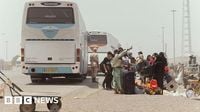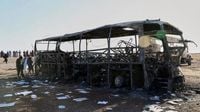On a quiet Tuesday evening, August 19, 2025, tragedy struck the dusty highways of Herat province in northwestern Afghanistan. A bus packed with Afghan migrants—most recently deported from Iran—collided with a fuel-laden truck and a motorcycle, erupting into a deadly inferno that killed at least 79 people, including as many as 19 children. The crash, which occurred around 8:30 p.m. local time, stands as one of the deadliest road accidents in Afghanistan’s recent memory, a grim marker in a nation already reeling from waves of forced returns and humanitarian crises.
According to multiple sources, including BBC, France 24, and The Associated Press, the bus was en route from Islam Qala, a border town near Iran, to Kabul. All passengers were Afghan returnees, many of whom had lived in Iran for years—some, for generations—before being swept up in Iran’s intensified deportation campaign. "All the passengers were migrants who had boarded the vehicle in Islam Qala," confirmed Mohammad Yousuf Saeedi, spokesman for the Herat provincial governor, to AFP.
The collision’s aftermath was horrifying. Eyewitnesses described a scene of chaos and devastation. "There was a lot of fire... There was a lot of screaming, but we couldn't even get within 50 metres (160 feet) to rescue anyone," 34-year-old Akbar Tawakoli told AFP. The truck’s petroleum cargo instantly sparked a fire that engulfed the bus, making rescue impossible for the first responders who arrived quickly but could do little more than watch the flames consume the vehicles. Only three people initially survived, but two succumbed to their injuries soon after, leaving just one critically injured survivor, according to provincial officials cited by France 24 and CBS News.
Reports on the exact death toll varied slightly in the immediate aftermath, with figures ranging from 75 to 79. The Herat provincial information department ultimately confirmed 78 deaths, while other outlets cited 79, including up to 19 children. Many of the bodies were so badly burned they were unidentifiable, noted Mohammad Janan Moqadas, chief physician at the military hospital that received the victims.
Herat police attributed the accident to the bus driver’s "excessive speed and negligence," AFP reported. The crash occurred on a major highway notorious for its poor condition, a legacy of decades of war and neglect. Afghanistan’s roads are perilous, with traffic regulations weakly enforced and vehicles often overloaded. Deadly accidents involving fuel tankers and buses are sadly common: in December 2024, a similar highway crash killed at least 52, and in March 2024, more than 20 perished in Helmand province under almost identical circumstances.
But the Herat tragedy was not just a random accident—it was the deadly consequence of seismic shifts in the region’s migration policies. Since January 2025, more than 1.5 million Afghans have been forced to return from Iran, according to the UN Refugee Agency. Another 184,459 were sent back from Pakistan, and over 5,000 deported from Turkey since the start of the year. Nearly 10,000 Afghan prisoners have also been repatriated, mostly from Pakistan. These forced returns have accelerated since June, following a brief war between Iran and Israel. In the aftermath, Iranian authorities cited national security concerns as justification for the mass expulsions, though critics, as reported by BBC, suggest Tehran may be scapegoating Afghans for its own internal security failures.
The Taliban, Afghanistan’s de facto rulers, voiced sharp criticism of neighboring countries’ expulsion policies in July, calling the mass deportations a violation of international norms and humanitarian principles. Tehran and Islamabad have denied targeting Afghans specifically, insisting they are simply enforcing immigration laws. Yet, as millions of Afghans are forced back into a country struggling with poverty, high unemployment, and aid cuts, the humanitarian toll is mounting.
"The return of so many people is creating an additional strain on already overstretched resources, and this new wave of refugees comes at a time when Afghanistan is starting to feel the brutal impacts of aid cuts," said Arshad Malik, country director of Save the Children Afghanistan, in a statement to BBC. The Ministry of Refugees and Repatriation estimates that some 6 million Afghan refugees remain overseas, while those returning often arrive with little more than the clothes on their backs, facing a homeland ill-equipped to support them.
Many returnees have lived outside Afghanistan for decades, having fled during the Soviet invasion in 1979, the civil wars of the 1990s, or the Taliban’s return to power in 2021. Now, they return to a nation where more than half the population relies on humanitarian assistance, and where women and girls face severe restrictions on education and public life. The United Nations has warned that Afghanistan is experiencing a "multi-layered human rights crisis," with some returnees reportedly subjected to torture or threats by the Taliban because of their identity or history.
Despite these challenges, Taliban officials insist that returnees are not mistreated and receive cash, food, health care, and other support upon arrival. Critics, however, say the support is insufficient given the sheer volume of people and the country’s dire economic situation. The crash in Herat, then, is more than a transportation tragedy—it is a stark illustration of the risks and hardships faced by Afghans uprooted from their lives abroad and forced to return to a country in turmoil.
International rights groups and humanitarian agencies have condemned the mass expulsions by Iran and Pakistan. Experts warn that Afghanistan lacks the capacity to absorb such a large influx of returnees, especially in the absence of robust international aid. The Taliban government has called for an investigation into the Herat accident, expressing "deep sorrow" over the loss of life and vowing to examine the circumstances that led to the disaster.
As cleanup crews worked into Wednesday morning to remove the charred wreckage from the roadside, the scale of the tragedy became painfully clear. The accident, described by the state-run Bakhtar News Agency as one of the deadliest in years, has left families shattered and communities in mourning. "I was very saddened that most of the passengers on the bus were children and women," said an eyewitness, Abdullah, to AFP.
The Herat crash has reignited debate over the safety of Afghanistan’s roads, the plight of returnees, and the broader humanitarian crisis facing the country. For now, the families of those lost in the flames—and the millions still in limbo across the region—are left to grapple with the consequences of policies and circumstances far beyond their control.
In the end, the scorched highway in Herat stands as a somber reminder of the human cost of displacement, deportation, and the relentless search for safety in a world that too often turns its back.


